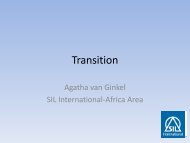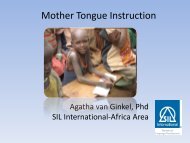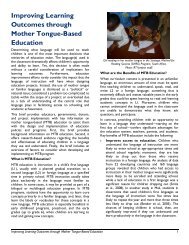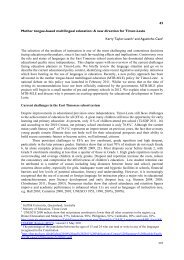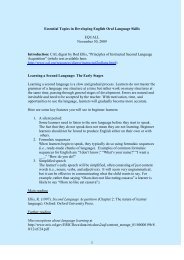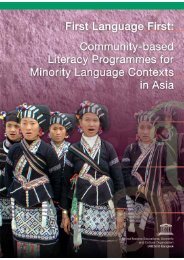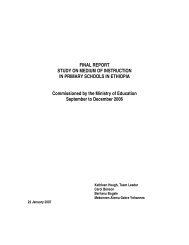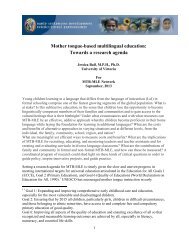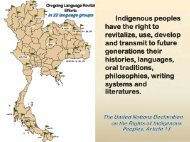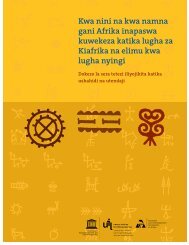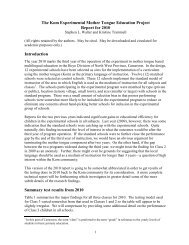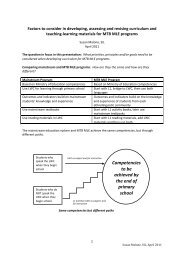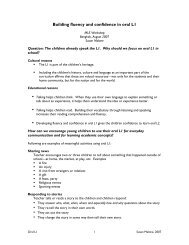Part II.pdf - MTB-MLE Network
Part II.pdf - MTB-MLE Network
Part II.pdf - MTB-MLE Network
Create successful ePaper yourself
Turn your PDF publications into a flip-book with our unique Google optimized e-Paper software.
manuscripts on various issues. The writers were further informed about the process of grading<br />
books into different levels for different groups of learners. As per GVSA rules, the books for<br />
neo-literates should be graded into Level 1, 2, and 3 according to the number of words, sentences,<br />
and illustrations in a particular book.<br />
The manuscripts were then field-tested, and modifications or corrections were made. This was<br />
followed by the review of the final manuscripts by Rabha language experts. Finally, the manuscripts<br />
were printed and published. They will be used as supplementary reading materials.<br />
Literacy campaign in Rabha language<br />
Our earlier experience of working with the Rabha community of Assam brought out certain vital<br />
facts. There are a number of sub-groups within the community who speak variations of the dialect.<br />
Some of the weaker dialects are dominated by other stronger dialects. Others have merged with<br />
the mainstream language, completely forgetting their own language. For example, the Patirabha<br />
group among the Rabhas does not know the Rabha language, but rather, speaks Assamese.<br />
During standardization of a minority language, there is often conflict within the community. Again,<br />
it is impractical to prepare primers in various dialects of a language so the weaker dialects die out.<br />
Hence, it is more practical to include words of various dialects. For example, words from different<br />
spoken sub-groups of Assam are incorporated into standard Assamese. This has not only enriched<br />
the language, but has also helped in creating a broader society.<br />
Our earlier experiment of preparing books in the Rabha language was bilingual-Rabha and<br />
Assamese. This is because some Rabha people have merged with the mainstream linguistically,<br />
thereby decreasing the number of Rabha speakers. This bilingual approach will help those people<br />
to learn their language along with Assamese. This will give them confidence and a sense of belonging<br />
to their own community, as well as prepare them to face the outside world.<br />
In this project, our objective is to prepare<br />
primers in the Rabha language along with<br />
Assamese, so that they can first learn their<br />
language and, after becoming literate, can go<br />
with confidence to learn the mainstream<br />
language. We hope this will have a huge<br />
impact on the literacy rate of the community.<br />
Preparation of Primers<br />
A week long workshop entitled “Preparation<br />
of Learning Materials” was organized by the State Resource Centre, Assam from July 14-20, 2003.<br />
The purpose of the workshop was the preparation of a Rabha primer according to Improved Pace<br />
and Content of Learning (IPCL) norms, promoting education in the mother tongue at the primary<br />
level. This is the second phase of the UNESCO-sponsored project.<br />
177



